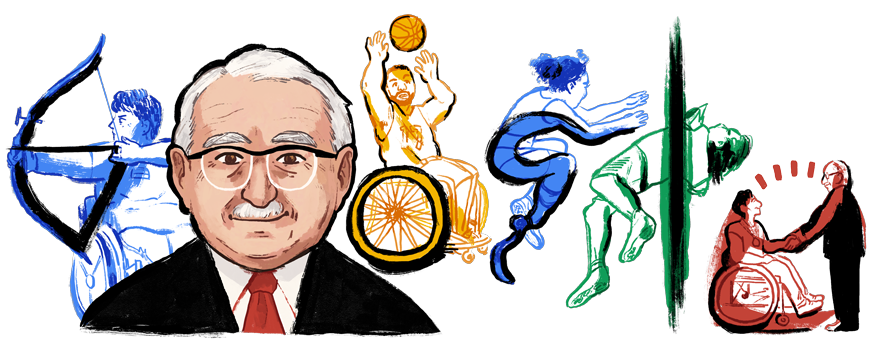Dr Ludwig Guttmann Paralympics :
Sir Ludwig “Poppa” Guttmann CBE FRS (3 July 1899 – 18 March 1980) was a German-born British neurologist who established the Paralympic Games in England. A Jewish doctor, who had fled Nazi Germany just before the start of the Second World War, he is considered to be one of the founding fathers of organised physical activities for people with a disability
Guttmann earned a medical degree from the University of Freiburg in 1924 and subsequently became a leading neurosurgeon. With the rise of the Nazis, Guttmann, who was Jewish, left Germany in 1939 and moved to England. In 1944 he became head of the National Spinal Injuries Centre at Stoke Mandeville Hospital in Aylesbury, where he remained until he retired in 1966.
Guttman championed the concept of early treatment for injured servicemen in specialized spinal units and promoted the use of compulsory sport and physical activities as a form of rehabilitation, integration, and motivation. To this end, he organized an archery contest between 16 disabled patients, and the event was held on July 29, 1948, which coincided with the opening of the 1948 Olympic Games in London. The following year more events and participants were featured, and the competition was named the Stoke Mandeville Games. The event became international in 1952, and that year Guttman helped found the International Stoke Mandeville Games Committee. (The organization subsequently underwent several name changes before merging with the International Sports Organisation for the Disabled [ISOD] in 2004 to become the International Wheelchair and Amputee Sports Federation.)
Early Life
Ludwig Guttmann was born on 3 July 1899 to a German-Jewish family in Tost, within what was then German-controlled Upper Silesia and is now Toszek in Poland. His family moved when he was three years old to the Silesian city of Königshütte (today Chorzów, Poland) where he passed his Abitur at the humanistic grammar school in 1917 before he was called up for military service.
Early career
Guttmann first encountered a patient with a toe injury in 1917, while he was volunteering at the Accident Hospital in Königshutte. The patient was a coal miner who later died of sepsis. Guttmann started his medical studies in April 1918 at the University of Breslau. He transferred to the University of Freiburg in 1919 and received his Doctorate of Medicine in 1924.
By 1933, Guttmann was working in Breslau (now Wrocław, Poland) as a neurosurgeon and lecturing at the university.Guttmann learned from the pioneer of neurosurgery Otfrid Foerster at his research institute. Despite having worked successfully as first assistant to Foerster, Guttmann was expelled from his university appointment and his job in 1933 under the Nuremberg Laws and his title changed to “Krankenbehandler” (one who treats the sick). With the arrival of the Nazis in power, Jews were banned from practising medicine professionally and he was assigned to work at the Breslau Jewish Hospital, where he became medical director in 1937. Following the violent attacks on Jewish people and properties during Kristallnacht on 9 November 1938, Guttmann ordered his staff to admit any patients without question. The following day he justified his decision on a case-by-case basis with the Gestapo. Out of 64 admissions, 60 patients were saved from arrest and deportation to concentration camps.
Google Celebrates Professor Sir Ludwig Guttmann’s 122nd Birthday with a Doodle

Today’s Doodle, illustrated by Baltimore-based guest artist Ashanti Fortson, celebrates the 122nd birthday of Jewish, German-born British neurologist Professor Sir Ludwig “Poppa” Guttmann, founder of the Paralympic movement.
Guttmann was born in Tost, Germany (now Toszek, Poland) on this day in 1899 and went on to receive his M.D. in 1924. He subsequently began research on spinal cord injuries and performed several neurosurgical procedures, rising to prominence as one of Germany’s top neurosurgeons by his early thirties. However, with the rise of the Nazi party and the passing of the Nuremberg Laws in 1933, Guttmann was prevented from practising medicine professionally. Following Kristallnacht in 1938 and the increasing persecution of Jews in Germany, Guttmann was forced to leave Germany with his family and was able to escape to England in 1939.
In England, Guttmann advanced his research in paraplegia. In 1944, he put his innovative approach into practice as the director of the National Spinal Injuries Center at Stoke Mandeville Hospital. In 1948, he organized a 16-person archery contest, one of the first official competitive sporting events for wheelchair users. Later called the “Stoke Mandeville Games” or the “Olympics for the Disabled,” the competition demonstrated the power of elite sport to break down barriers for disability and garnered the attention of global medical and sporting communities.
In 1960, Guttmann facilitated the International Stoke Mandeville Games, following the 1960 Summer Olympics, the first of many Paralympic Games. His passion for patient care never faltered—he also founded the International Medical Society of Paraplegia (the International Spinal Cord Society) and the British Sports Association for the Disabled (Activity Alliance) in 1961. He received numerous accolades for his contributions, the highest among which was being knighted by Her Majesty the Queen in 1966.
Today, Paralympic athletes are rightfully recognized for their skills and achievements. The Paralympic Games continue to be a driving force for promoting the rights and independence of people with disabilities, with a lasting impact on equal treatment and opportunity.
Happy birthday, Prof. Sir Ludwig Guttmann!
Be the first to comment